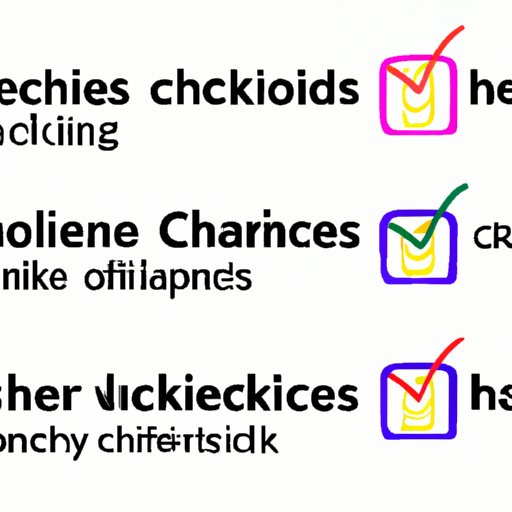
Introduction
Background checks have become a standard procedure for many organizations and individuals prior to hiring someone or entering into a business relationship. A background check is the process of verifying someone’s history, credentials, or criminal record. In today’s world, where cybercrime is on the rise, a background check is as essential as a job application or a business plan. This article will provide a comprehensive guide to getting a background check, including the types, how and where to get it, ways to interpret the results, online vs. offline checks, the risks of skipping a background check, and how to protect your privacy during the process.
The Complete Guide to Getting a Background Check
Before you proceed to conduct a background check, it’s essential to know the different types available. These include:
- Criminal background check
- Credit background check
- Driving record check
- Employment background check
While each of these checks has a specific purpose, most background checks cover all categories. This guide provides step-by-step instructions for obtaining a background check, either online or offline.
How to Get a Background Check Online or Offline
When it comes to obtaining a background check, there are many options available. Your decision will depend on the type of check you need and the level of detail required. Here are some methods to consider:
- Hire a screening firm, which provides background screening services for a fee.
- Contact a private investigator or law firm that specializes in background investigations.
- Use an online background check service such as BeenVerified, Instant Checkmate or TruthFinder. These services scrape public information, such as criminal records, court records, and social media accounts.
- If you are an employer, you can use the services of third-party administrators such as Sterling or GoodHire that provide employment background checks.
- If you are a landlord, you can use services specifically designed to perform tenant screening checks, such as SmartMove and Cozy.
- Visit the local county clerk’s office or any court in the respective state to access public records, including criminal records, divorce cases, and bankruptcy filings, among others.
It’s necessary to scrutinize your options and choose the right one for your needs. Before choosing any method, ensure that your request is legal and that you are authorized to conduct the check.
Tips for Ensuring the Accuracy of the Report
Background checks may occasionally have discrepancies. For instance, when a report highlights the wrong person or information. Here are some tips to help ensure the accuracy of the report:
- Ensure that the individual’s name, date of birth, and social security number are precise and accurate.
- If possible, collect information from multiple sources to ensure consistency.
- Use reputable services with a proven track record of providing accurate information.
- Review the report for any errors after it is delivered and contact the service provider to rectify any errors.
How to Get a Background Check on Yourself
Conducting a self-background check is an excellent strategy for familiarizing yourself with your personal information, uncovering any errors or inaccuracies, and addressing any potential issues before an employer conducts a check. Here are some ways to obtain the information:
- Request a report from a specialized agency. This option costs money, but the report should contain most of the essential parts of your background. Examples of such agencies include Experian, Equifax, and TransUnion.
- Execute web searches for your name in quotation marks or use an online background check service such as TruthFinder, BeenVerified, or Instant Checkmate. These services can provide information on your criminal records, public records, and other online sources.
- Search public databases, such as court records, property ownership records, and voter registration records. This information is often available on the websites of local and state governments.
- Contact the local police department or state patrol for your driving record.
- A credit report will often show your employment history as well. Request a copy of your credit report from a credit reporting agency.
When conducting a self-background check, pay attention to any potential errors or inaccuracies. If you identify any, take steps to correct the errors, and if applicable, request a report from an official background check service provider.

What Employers Look for on a Background Check
Employers conduct background checks to confirm information on resumes, identify any red flags or inconsistencies, and ultimately select the best candidate for the job. An employer generally looks for the following pieces of information on a background check:
- Identity verification: This includes checking the individual’s name, date of birth, and social security number.
- Employment history: Employers verify work experience, professional licensing, and education levels.
- Criminal record: This includes identifying candidates who have a history of criminal activity or have engaged in any illegal activities.
- Credit history: Employers use credit checks to assess an individual’s financial responsibility.
- Driving record: Employers perform a driving record check to ensure that the candidate has a valid driver’s license and has no history of significant violations such as DUIs or speeding tickets.
The Risks of Skipping a Background Check
Not conducting a background check can put an organization or an individual at significant risk. By skipping a background check, you run the risk of:
- Hiring an individual who has a history of criminal activity, which may pose a danger to your organization or your clients.
- Exposing your organization to financial risk if the individual has a history of theft or embezzlement.
- Associating your organization with individuals who have a history of participating in illegal activities or unethical behavior.
- Having legal action taken against you for failure to conduct a background check due to compliance issues.
To mitigate these risks, it is essential to conduct a thorough background check before hiring anyone or entering into any business relationship.
How to Interpret the Results of a Background Check
Interpreting the results of a background check can be a complicated process, especially if the report contains legal, technical jargon. Here are some tips for interpreting the report:
- Familiarize yourself with the report by reading it thoroughly and highlighting any essential parts.
- Confirm that the information is accurate and up to date.
- Focus on any red flags and investigate them further through additional research.
- Use reputable sources to interpret confusing terms or documentation.
- When in doubt, contact the agency that provided the report to clarify any issues.
Online vs. Offline Background Checks: Pros and Cons
Choosing between online and offline background checks can be a challenging decision. Here are some of the advantages and disadvantages of each method:
Online Background Checks:
- Pros:
- Speedy turnaround.
- Comfortable and convenient.
- Cost-effective.
- Cons:
- Reliability issues. Some online services only provide limited information.
- The potential for inaccurate results.
- Risk of exposing sensitive information online.
Offline Background Checks
- Pros:
- Greater reliability. High-end services offer court-certified results.
- Guaranteed accuracy.
- Specialized services for specific needs.
- Cons:
- Expensive.
- Takes longer to obtain the results.
How to Protect Your Privacy During a Background Check
When conducting a background check, it’s essential to protect your privacy. Here are some tips:
- Provide your personal information only to reputable agencies.
- Ensure that the information you provide is accurate and consistent.
- Regularly review your credit reports and fix any errors.
- Consider using a Virtual Private Network (VPN) or secure browser when conducting online searches.
- Where possible, avoid disclosing sensitive information, such as financial information and social security numbers, during an application process unless it is absolutely necessary.
Conclusion
A background check is an essential tool for verifying someone’s history, credentials, or criminal record. This article provides a comprehensive guide to conducting background checks. Whether you are an employer, a tenant, or an individual interested in learning more about the importance of conducting a background check, this guide aims to provide you with all the information you need, from types of checks available to interpreting the results. By following these tips, you can ensure that you obtain a reliable and accurate report while protecting your privacy.





